System Storage Benchmarks
For our SSD comparisons, we are comparing similar PCIe Gen5 x4 NVMe SSDs in this performance tier, all the SSDS on the graph are PCI-Express 5.0 x4 NVMe SSDs.
3DMark
We are using 3DMark’s Storage Benchmark which tests common gaming workload traces. The benchmark tests loading Battlefield V, Call of Duty Black Ops 4, and Overwatch. It tests moving games by copying a Steam folder for CS:GO, and installing Outer Worlds from the Epic Games Launcher, and saving game progress in The Outer Worlds. It tests recording a 1080p gameplay video at 60FPS with OBS while playing Overwatch. We will graph the Overall Benchmark Score, higher is better.
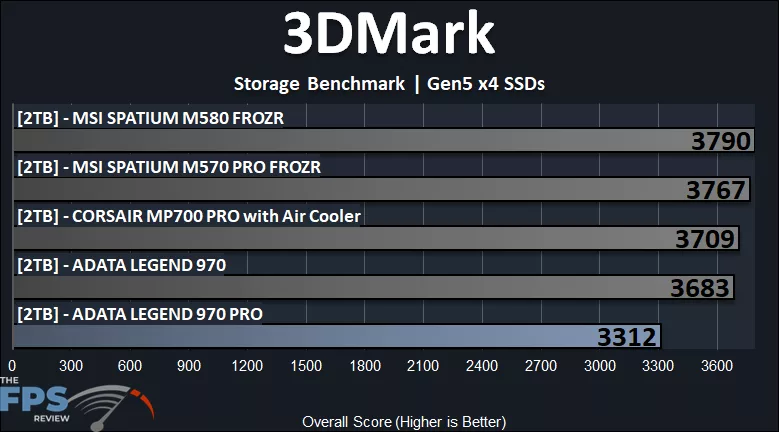
In our review, in the 3DMark Storage Benchmark, the ADATA LEGEND 970 PRO 2TB PCIe Gen5 NVMe SSD performed with an overall score of 3,312. With this score, the SSD is sitting towards the bottom of the comparisons in performance, for overall gaming performance as indicated by 3DMark’s Storage Benchmark.
We do find that the ADATA LEGEND 970 was faster, with the ADATA LEGEND 970 PRO 2TB PCIe Gen5 NVMe SSD being 10% slower, on average, than the previous generation ADATA LEGEND 970. The Phison controller in the ADATA LEGEND 970 stays strong here, with latency being one of the contributing factors, as you’ll continue to see in the PCMark storage tests below as well. The fastest drive in the comparison is the MSI SPATIUM M580 FROZR, which means the ADATA LEGEND 970 PRO 2TB PCIe Gen5 NVMe SSD is 13% under that in performance, so the spread is between 10-13% slower for the ADATA LEGEND 970 PRO 2TB PCIe Gen5 NVMe SSD in 3DMark storage test.
PCMark 10
We are using PCMark 10’s Full System Drive Storage Benchmark. It outputs an overall score (higher is better) that is derived from the Bandwidth (higher is better) as well as access time (lower is better) results.
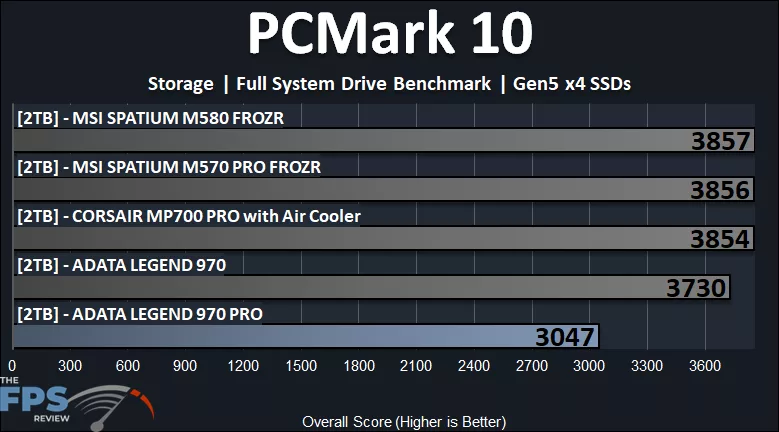
In PCMark 10’s full system drive storage benchmark, the ADATA LEGEND 970 PRO 2TB PCIe Gen5 NVMe SSD weighs in with an overall score of 3,047. At 3,047 the ADATA LEGEND 970 PRO 2TB PCIe Gen5 NVMe SSD is sitting toward the bottom of the chart once again, on overall full system drive performance as indicated by PCMark 10. When we compare the SSD to the previous generation ADATA LEGEND 970, we find that the ADATA LEGEND 970 PRO 2TB PCIe Gen5 NVMe SSD is 18% slower overall. When we compare this with the fastest drive, the ADATA LEGEND 970 PRO 2TB PCIe Gen5 NVMe SSD is 21% slower, so the range is 18-21% slower overall.
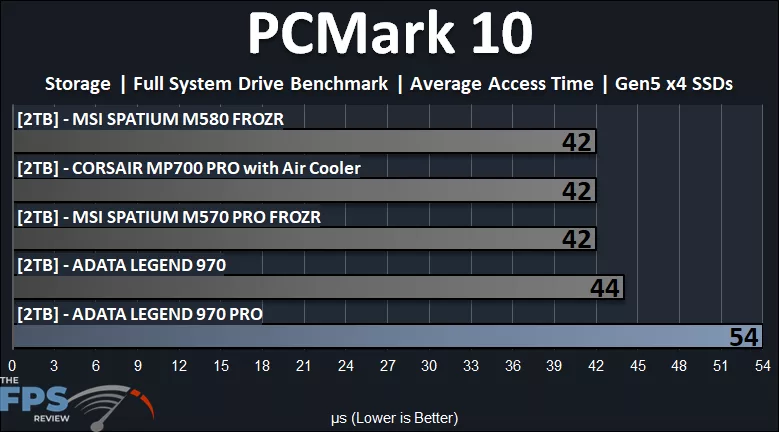
There is a reason for the ADATA LEGEND 970 PRO 2TB PCIe Gen5 NVMe SSD’s performance in PCMark and 3DMark benchmarks, and that is the latency. The graph above shows why the ADATA LEGEND 970 PRO 2TB PCIe Gen5 NVMe SSD is slower in these benchmarks. We see that the latency on the ADATA LEGEND 970 PRO 2TB PCIe Gen5 NVMe SSD is 54, and that is much much slower than every other SSD. The previous generation ADATA LEGEND 970 is in-line with the other SSDs at 44, thanks to that Phison controller. The InnoGrit controller just simply can’t match the Phison’s on latency, and this shows in the benchmarks.
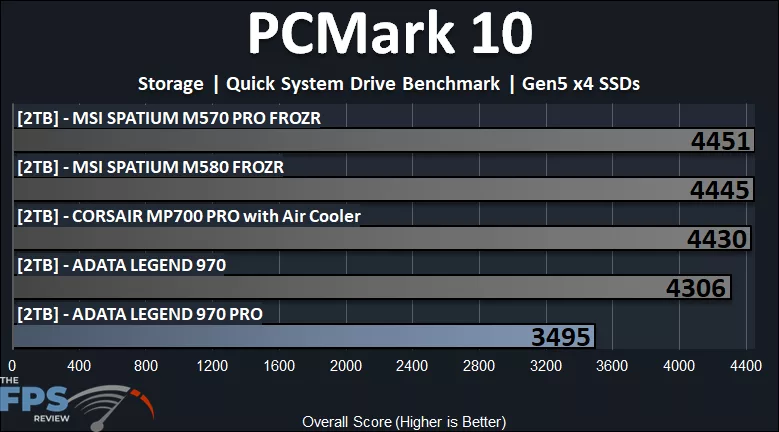
PCMark 10’s quick system drive storage benchmark focuses on smaller workloads, and typically, this is where we see the benefit of a DRAM cache. However, because the latency is so poor on the InnoGrit controller, the ADATA LEGEND 970 PRO 2TB PCIe Gen5 NVMe SSD lags behind even on this test. The ADATA LEGEND 970, also with a DRAM cache, outperforms the ADATA LEGEND 970 PRO 2TB PCIe Gen5 NVMe SSD in small workloads. The ADATA LEGEND 970 PRO 2TB PCIe Gen5 NVMe SSD ends up being 19% slower than the ADATA LEGEND 970 in PCMark 10’s quick system drive benchmark. When compared to the fastest drive, the ADATA LEGEND 970 PRO 2TB PCIe Gen5 NVMe SSD is 21% behind, so the range is 19-21%.
PassMark PerformanceTEST
We are using PassMark’s PerformanceTEST Disk Mark benchmark only. This test benchmarks Disk Sequential Read, Disk Sequential Write, IOPS 32KQD20, IOPS 4KQD1 tests and outputs an overall score (higher is better.)
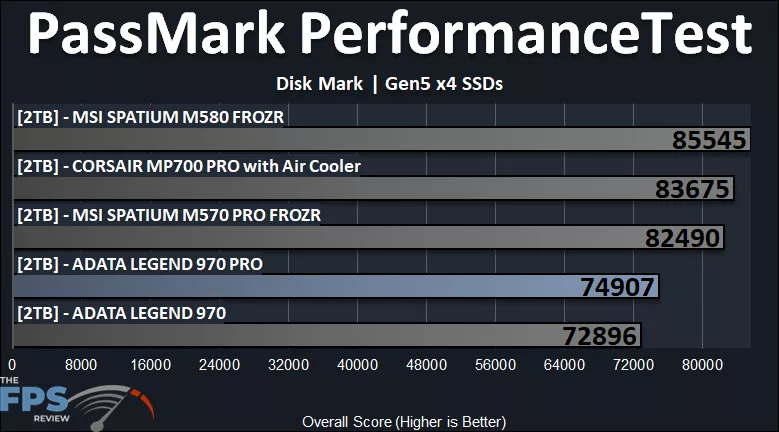
In PassMark PerformanceTest Disk Mark this benchmark takes everything into consideration, small workloads, large workloads, access time, and DRAM cache, and we actually see the ADATA LEGEND 970 PRO 2TB PCIe Gen5 NVMe SSD do much better comparatively. Finally, the ADATA LEGEND 970 PRO 2TB PCIe Gen5 NVMe SSD is faster than the previous generation ADATA LEGEND 970, by 3%, it isn’t much, but it is a win at least. It still sits quite below a few of the other PCIe Gen5 SSDs, however, sitting 12% below the fastest SSD on this graph.
